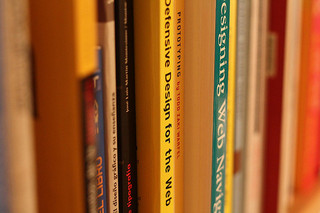The Library Book Game
Even though my library of eBooks has continued to grow, I find there’s nothing quite like the feel of an actual book in-hand. Books have always fascinated me. They contain not only knowledge, but also represent something very human. Even my books on the most esoteric and weird subjects are works of passion. I need to respect that.
While I treasure my formal education and celebrate many great teachers and mentors who taught me through that process, I think the greatest thing I learned was the ability to learn and think for myself. Education does not stop when the last school book is closed and the paper and pencils are dropped unceremoniously into the backpack for the final trip home. Education, true education, is a life-long pursuit.
I’d like to tell you about one approach that I’ve found fascinating over the years. It’s called The Library Book Game. It’s played thus:
The Library Book Game
- Go down to your local library.
- Head over to the non-fiction section of the library.
- Walk down the aisles pulling books out at near-random.
- When you have a good dozen or so, go to the checkout counter.
- Check out the books.
- Take them home.
- Make an effort to digest the information in each book.
- Return the books to the library.
- Repeat.
It’s a very simple game—one that’s exposed me to many new and interesting topics. After a round of the game, one’s stack of borrowed books should read like a cornucopia of knowledge. For example, the subjects could be something like this:

Doors to New Worlds
- Raku Pottery Techniques
- Great Car Drives of the World
- The Noir Comic Style
- Flags and Heraldry
- Electronic Circuitry
- Steampunk Jewelry
- Bonsai Trees
- Chinese Natural Cures
- Informational Graphics
- Book Design
- Securing Online Linux Servers
- etc.
Variety is the key. If you are playing the game properly, there will be books on a number of subjects about which you will know nothing. That’s what you want… the chance to discover something new.
Aside: In full disclosure, the above list was generated by looking at the books that just happened to be in the same room as I was while writing this article. The game’s come home for me, apparently.
You’ll also notice in the above directions I say “digest’ not “read’ the books. Some of the ones you choose won’t be worth the time to read in their entirety. Others will be. The important bit is you try to learn something about the reason why the book was written. In other words, at least one person devoted an extremely significant amount of time to publish this book. Why would they dedicate so much time and effort to something?
You are trying to find another’s passion and in some small way try to make it your own (at least for a time).
You may ask, why not just play this online? There’re plenty of Wikipedia games out there. Isn’t it basically the same thing?
Yes and No. In some ways we all do this online. We call it “surfing the net’. The problem with it is intent. Many of the Wikipedia games are about how quickly one can link two subjects. It’s about what you already know (or can discover), not about learning new things. However, if online is your one and only domain and you can’t be “bothered’ to physically go to the “house of knowledge’, might I suggest watching Rives‘ excellent TEDx talk Reinventing the Encyclopedia Game. It’s close, but not quite exactly the same thing.
However, to each his own.
To close, I’d like to share with you what Ray Bradbury once said when asked if he was self-educated.
Yes, I am. I’m completely library educated. I’ve never been to college. I went down to the library when I was in grade school in Waukegan, and in high school in Los Angeles, and spent long days every summer in the library. I used to steal magazines from a store on Genesee Street, in Waukegan, and read them and then steal them back on the racks again. That way I took the print off with my eyeballs and stayed honest. I didn’t want to be a permanent thief, and I was very careful to wash my hands before I read them. But with the library, it’s like catnip, I suppose: you begin to run in circles because there’s so much to look at and read. And it’s far more fun than going to school, simply because you make up your own list and you don’t have to listen to anyone. When I would see some of the books my kids were forced to bring home and read by some of their teachers, and were graded on—well, what if you don’t like those books?
I am a librarian. I discovered me in the library. I went to find me in the library. Before I fell in love with libraries, I was just a six-year-old boy. The library fueled all of my curiosities, from dinosaurs to ancient Egypt. When I graduated from high school in 1938, I began going to the library three nights a week. I did this every week for almost ten years and finally, in 1947, around the time I got married, I figured I was done. So I graduated from the library when I was twenty-seven. I discovered that the library is the real school.
It’s now time for me to be off. It’s late and there’s a stack of books awaiting my attention on the bedside table.
Image courtesy of Rodrigo Galindez via CC-BY-2.0.